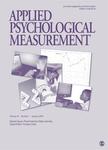版权所有:内蒙古大学图书馆 技术提供:维普资讯• 智图
内蒙古自治区呼和浩特市赛罕区大学西街235号 邮编: 010021

作者机构:Katholieke Univ Leuven Fac Econ & Business B-3000 Leuven Belgium Katholieke Univ Leuven Leuven Stat Res Ctr B-3000 Leuven Belgium
出 版 物:《APPLIED PSYCHOLOGICAL MEASUREMENT》 (Appl. Psychol. Meas.)
年 卷 期:2014年第38卷第6期
页 面:415-431页
核心收录:
学科分类:0402[教育学-心理学(可授教育学、理学学位)] 04[教育学] 0701[理学-数学]
基 金:KU Leuven
主 题:random weights linear logistic test model computerized adaptive testing D-efficiency Kullback-Leibler divergence mutual information
摘 要:This article discusses four-item selection rules to design efficient individualized tests for the random weights linear logistic test model (RWLLTM): minimum posterior-weighted D-error (D-B), minimum expected posterior-weighted D-error (EDB), maximum expected Kullback-Leibler divergence between subsequent posteriors (KLP), and maximum mutual information (MUI). The RWLLTM decomposes test items into a set of subtasks or cognitive features and assumes individual-specific effects of the features on the difficulty of the items. The model extends and improves the well-known linear logistic test model in which feature effects are only estimated at the aggregate level. Simulations show that the efficiencies of the designs obtained with the different criteria appear to be equivalent. However, KLP and MUI are given preference over D-B and EDB due to their lesser complexity, which significantly reduces the computational burden.